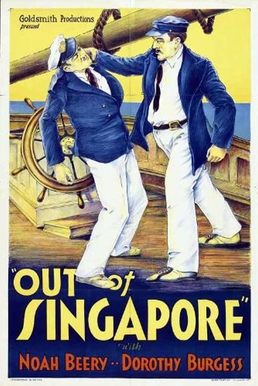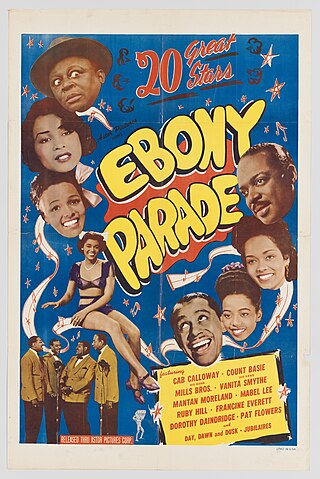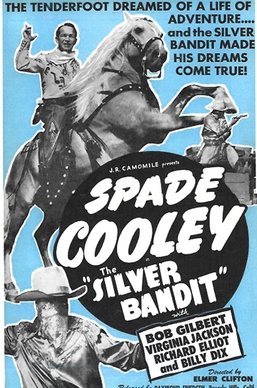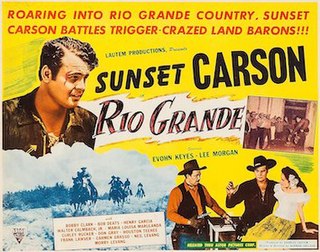Related Research Articles
Astor Pictures was a motion picture distribution company in the United States from 1930 to 1963. It was founded by Robert M. Savini. Astor specialized in film re-releases. It later released independently made productions, including some of its own films made during the 1950s.
Big Timers is a 1945 American musical comedy race film directed by Bud Pollard. The bottom of a poster for the film notes "The secrets of a chambermaid in a Sugar Hill Hotel!"

Tall, Tan, and Terrific is a 1946 American film directed by Bud Pollard and starring Mantan Moreland.

Girl On The Run is a 1953 ultra-low-budget independent production, the plot of which drops a standard crime melodrama into the noirish, tawdry world of a carnival burlesque show. According to filmographer Michael Pitts, "Released by Astor Pictures late in 1953, Girl on the Run was filmed as The Hidden Woman. A Rose Tree Production, it opens and closes with scenes of a hysterically laughing mechanical clown and all its action takes place during one night at a tatty carnival."

Adrienne Dore was an American actress, model, and beauty pageant winner. She was first runner-up in the Miss America 1925 pageant, competing as Miss Los Angeles. Dore went on to have a modest career in motion pictures before retiring in 1934.

It Happened in Harlem is an American musical comedy film directed by Bud Pollard and starring Chris Columbus, Phil Gomez, and Nicky O'Daniel. The film was partly shot at Smalls Paradise and released in 1945. However, no prints of the film are held in any archives and is presumed Lost media

Out of Singapore is a 1932 American pre-Code drama film directed by Charles Hutchison and starring Noah Beery, Dorothy Burgess and Miriam Seegar. The film was re-released by Astor Pictures in 1941 as Gangsters of the Sea.
A Boy, a Girl and a Dog is a 1946 American drama film directed by Herbert Kline and written by Maurice Clark, Irving Fineman and Herbert Kline. The film stars Sharyn Moffett, Jerry Hunter, Harry Davenport, Lionel Stander, Charles Williams and Charlotte Treadway. The film, shot in part at the War Department's Canine Training Center in San Carlos, California was completed in 1944 but was not released until July 1, 1946, by Film Classics. The film was rereleased in 1951 by Astor Pictures as Lucky, the Outcast.
Brud Talbot was an American film actor, producer, director and writer.

Ebony Parade is a 1947 American musical compilation film made from footage of African-American performers. The three-reel film featured jazz music from many acts with interstitial segments featuring Mantan Moreland as a comedic magician. Advertised as including 20 great stars, it was an Astor Pictures release. The National Museum of African American History and Culture has a poster for the film. Getty Images also has an image of a poster from the film.
The Joint is Jumping is a musical comedy film from 1949. A "race film" with an African American cast of performers, it was one of several such films produced by the All-American News film company and directed by Josh Binney. It was written by Hal Seeger. The 4-reel film was previewed in the Chicago Defender October 16, 1948.

Frontier Justice is a 1935 black-and-white Western film directed by Robert F. McGowan starring Hoot Gibson based on the novel by Colonel George Brydges Rodney. Produced for Walter Futter's Diversion Pictures, it was rereleased by Grand National Pictures in 1937 and later reissued by Astor Pictures in the 1940s.
William Lewis Nolte (1889–1965) was a screenwriter and film director in the United States. He directed the musical film The Duke Is Tops released by Million Dollar Productions. It was re-released in 1943 under the title The Bronze Venus. He is credited as a production manager for the 1942 film Thunder River Feud and as a line producer on the 1947 film Shadow Valley. From 1949 until at least 1957 he was an assistant director on several films.

The Silver Bandit is a 1950 American musical Western film directed by Elmer Clifton and starring Spade Cooley, Bob Gilbert and Ginny Jackson. It was originally shot in 1947 on a budget of $30,000, but wasn't picked up for distribution for three years. It was the final film of the veteran director Elmer Clifton.

Samuel Sherman Krellberg was a film distributor and producer in the United States. The Library of Congress has a collection of his papers. He distributed films nationally under various corporate names including Regal Talking Pictures, Super Serial Productions, Goodwill Pictures and Ultra Pictures. His mainstay business, however was the New York "states rights" (regional) Principal Film Exchange, which he acquired from Sol Lesser in 1936.
The Highest Tradition is a 1946 documentary film from the U.S. about African American war heroes. It was written and produced by William D. Alexander. It is a World War II era war propaganda film. Fredric March narrates. The film begins with stock footage of the Pearl Harbor it then transitions into profiles of African American war heroes.
Midnight Menace is a short American musical film released in 1946. It was produced by All-American News and Al Sack. Josh Binney directed. The plot involves a Voodoo practitioner making dead bodies appear around Lollypop Jones. The film features songs by Fats Waller and Andy Razaf. An alternative description of the plot says the film is about a Voodoo practitioner hypnotizing a man's wife and using her in his stage show.
Milton Woods was an actor. He was in several films. In 1946, Newsweek described him as the "colored Basil Rathbone". In 1951, Jet reported that he directed of the American Negro Repertory Theater, touring the country in a trailer.

Rio Grande is a 1949 American western film directed by Norman Sheldon and starring Sunset Carson, Lee Morgan and Bobby Clack. It was distributed by the low-budget company Astor Pictures. It was shot on location in San Ygnacio, Texas and at the Oliver Drake Ranch in California.
Burt Kelly was an American film producer and writer. He was best known for Columbia Pictures' Blondie series. He founded KBS Productions Inc. in 1932, along with Sam Bischoff and William Saal.
References
- ↑ pp. 5-6 Pitts, Michael R. Astor Pictures: A Filmography and History of the Reissue King, 1933-1965 McFarland, 12 Apr 2019
- ↑ p. 6 Pitts, Michael R. Astor Pictures: A Filmography and History of the Reissue King, 1933-1965 McFarland, 12 Apr 2019
- ↑ pp. 46-47 Cripps, Thomas Making Movies Black: The Hollywood Message Movie from World War II to the Civil Rights Era Oxford University Press, 1993